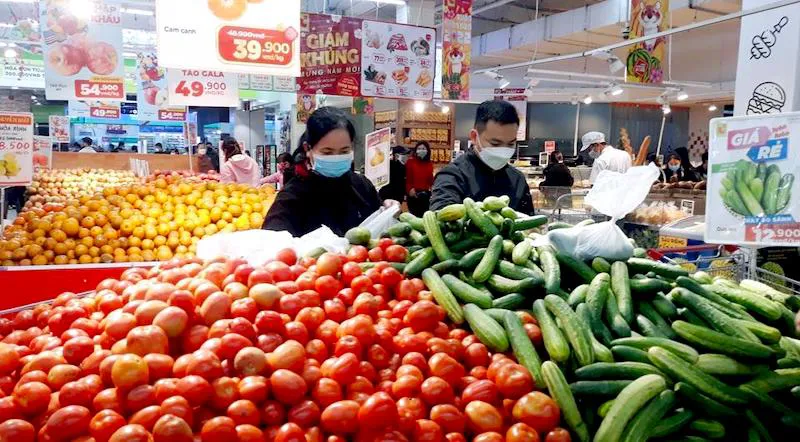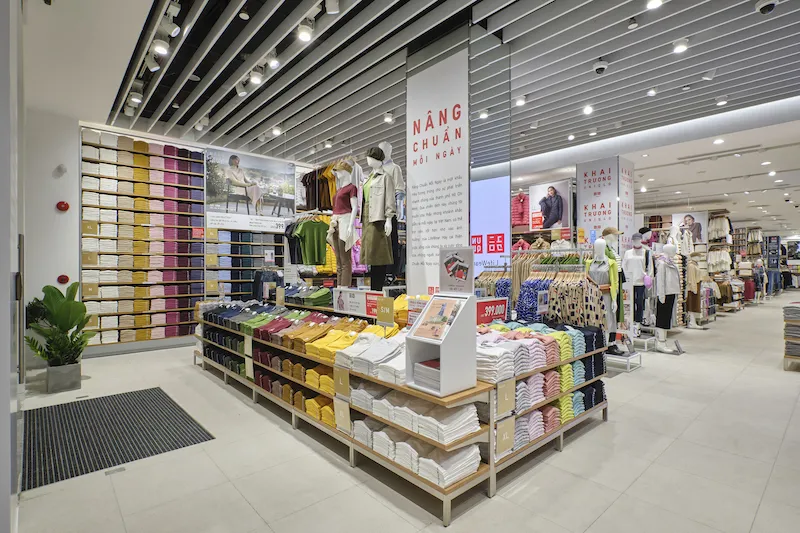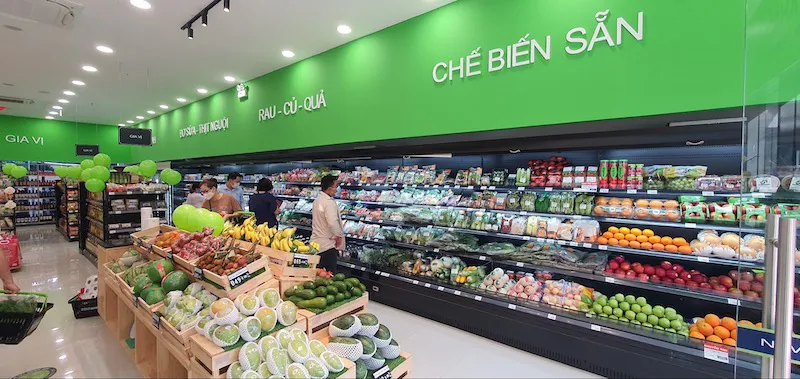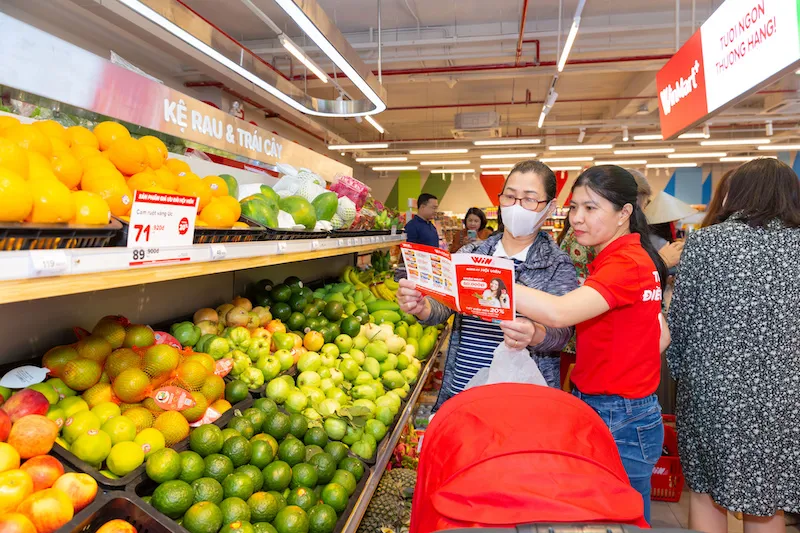Vietnam’s retail battle continues to be fiercer
Vietnamese companies are expanding their retail system to maintain their home turf advantage and market share.
In recent years, Vietnam's retail market has seen a significant presence of prominent international retailers, demonstrating the country's growing attractiveness to foreign investors and escalating rivalry between domestic and foreign companies.
The presence of foreign giants
| Local consumers shop at Hanoi's Big C Thang Long supermarket, owned by Central Retail Corporation. Photo: Hoai Nam/ The Hanoi Times |
Thailand's largest retail group, Central Retail Corporation (CRC), announced in February its plan to invest US$1.45 billion in Vietnam between 2023 and 2027.
Explaining why CRC is pouring money into the Vietnamese market, Olivier Langlet, CEO of Central Retail Vietnam, said: "Vietnam's economy continues to grow despite uncertainties. We expect Vietnam's GDP growth to be 6.7% this year, making Vietnam the fastest growing market in Southeast Asia."
As a result, the Thai giant aims to double the number of stores to 600 in 57 of Vietnam's 63 provinces in its five-year roadmap.
Another major retailer from Thailand, MM Mega Market Vietnam, planned to expand its depot and warehouses from south to north, with the recent opening of its fifth warehouse in Sapa Town in the northern province of Lao Cai. This is part of its strategy to develop the supply network system in 2020-2025, which aims to improve product quality, diversify supply sources for customers, and expand agricultural exports to regional countries.
Japan's AEON Group began constructing its seventh shopping mall in the central province of Thua Thien-Hue in February, and it is expected to open in April 2025. The retailer plans to build 16 more shopping malls in Vietnam by 2025, including three or four in Hanoi. Satoshi Nishikawa, Northern Area General Manager of AEON Vietnam, said the Japanese retailer aims to open 30 shopping malls, department stores, and supermarkets by 2030.
Meanwhile, UNIQLO, the parent company of Japan's Fast Retailing, announced to open another store at Aeon Mall Tan Phu Celadon, Ho Chi Minh City, this Summer and a plan to launch its first in the southern province of Binh Duong, bringing the total number of outlets to 18 and another online across Vietnam after nearly four years of operation.
| UNIQLO plans to launch its first store in the southern province of Binh Duong, increasing the total outlets to 18 in Vietnam. Photo: UNIQLO |
MUJI, one of the largest Japanese retailers in Vietnam, is also considering expanding in Hanoi in the second quarter of 2023 as part of its goal to open a total of 8-10 stores after being present in Vietnam for three years with five stores, two in Hanoi and three in Ho Chi Minh City.
Mr. Tetsuya Nagaiwa, General Director of MUJI Vietnam, claimed that Vietnam is one of the most potential retail markets in the world. With the advantages of a stable and growing economy and a young population with a rising average income, the country has attracted the attention of many investors, including MUJI.
A recent business survey by the Japan External Trade Promotion Organization (JETRO) showed that 100% of Japanese retailers in Vietnam expect their profits to increase this year. Among them, 80% said they would expand their business in Vietnam in the next one to two years.
Another report by the Ministry of Industry and Trade found that Vietnam's retail industry currently has a market size of US$142 billion and is expected to grow to US$350 billion by 2025, contributing 59% to GDP. These figures prove the attractiveness of the Southeast Asian retail market for foreign companies.
Vietnamese retailers' advantage
| Nova Commerce plans to open 2,000 Nova Market convenience stores by 2025. Photo: NovaGroup |
The market share of domestic retailers has come under some pressure as foreign retailers have invested heavily in the Vietnamese market. In addition, this encourages Vietnamese companies to look for ways to compete with foreign competitors.
Insiders have said companies should learn about local consumers' shopping habits and tastes before expanding their market share.
Le Huy Khoi, head of the Market Research and Forecasting Department at the Vietnam Institute of Industrial and Trade Policy and Strategy under the Ministry of Industry and Trade, said Vietnamese retailers might not be equal to foreign companies in terms of capital and scale, but they understand the tastes and shopping habits of Vietnamese people.
"The majority of Vietnamese consumers still prefer a fast and convenient way to shop, so choosing a retail location with a dense population and developing a niche market is a smart way for local retailers," he said.
Vietnam's retail industry has changed a lot in the past five years, including the cooperation between Masan Group, a Vietnamese consumer retailer, and Vingroup, a Vietnamese conglomerate, to become a large manufacturing and retail group in Vietnam. Masan Group's WinMart retail store system (WinCommerce) is almost unparalleled in the multi-utility services segment.
WinCommerce currently has more than 3,400 WinMart/WinMart+ supermarkets and convenience stores nationwide and four million loyal customers. Instead of expanding the supermarket/hypermarket model, the Vietnamese chain will focus on developing WinMart+ convenience stores in suburban areas and WINLife - the one-stop shop ecosystem in urban areas to strengthen the retail chain's position, said Nguyen Thi Phuong, Deputy General Director of WinCommerce.
In 2023, the company plans to open more than 1,500 outlets, bringing the total number of supermarkets and convenience stores in 63 localities to 5,000.
| WinCommerce plans to open more than 1,500 outlets, increasing its total supermarkets and convenience stores in 63 localities to 5,000. Photo: Masan Group |
Another Vietnamese retailer, Nova Commerce, a member of NovaGroup (the Vietnamese economic development and investment group), aims to develop 2,000 convenience stores, namely Nova Market, by 2025.
Deputy Director General of the Ministry of Industry and Trade's Domestic Market Department Le Viet Nga said Vietnamese enterprises are winning over foreign retailers in terms of presence and total retail sales of goods and consumer services. The total area of Vietnamese enterprises' shopping centers is twice that of foreign enterprises.
Domestic enterprises still dominate the retail market, accounting for 70-80% of outlets nationwide. These include companies such as WinMart, Co.op Mart, and Bach Hoa Xanh, which own thousands of retail outlets.
Local experts recommended that Vietnamese businesses be careful and try to improve the quality of customer service and product variety to maintain the advantage at home.
















